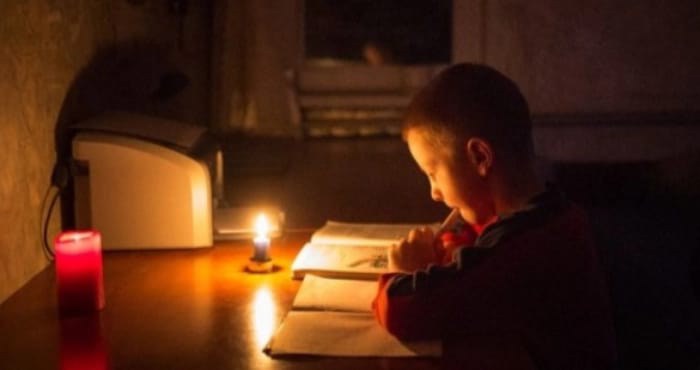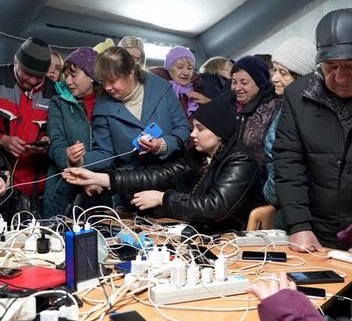
By Oleg Vernyk – Leader of the Independent Trade Union of Ukraine “Zakhist Pratsi” – Socialist League of Ukraine.
These words are written one day before a very sad dateline: 300 days since the beginning of the full-scale aggression of the Russian Federation against Ukraine. In this article, I would like to focus not on the analysis of the situation on the fronts, but on the most common human matter of this war. What ordinary Ukrainians feel and experience when they come face to face with a terrifying war – the biggest war on the European continent since 1945.
The most important test for the peaceful civilian population of Ukraine awaited us in the autumn of 2022. Russian rocket attacks and shelling of electric power facilities with the help of Iranian kamikaze drones, in fact, had a strong impact on changing the overall humanitarian situation in the country. Putin and Russian imperialism were eagerly waiting for all the horrors and dangers of a humanitarian catastrophe to bring Ukrainians to the streets, demanding that their authorities immediately capitulate to the occupier.
However, everything turned out to be completely different from what the dreamers-analysts in Moscow assumed. Millions of Ukrainian citizens were forced to adapt to the qualitatively changed reality of their lives, but they kept all their determination to resist the Russian armed aggression. And the more difficult the situation in Ukrainian families became day by day, the stronger the determination to resist became. No electricity, no water, no heating, no Internet and now very often no regular telephone communication. It is very difficult to understand for the citizens of those countries where peaceful life reigns and the horrors of war are available to them only in books and movies.
Using the example of my family, I want to illustrate our current life cycle. The family wakes up at 7.30 in the morning and while in the apartment there is 1 or 2 hours of light and water, we need to make water supplies for the day, cook food and send our kid to school. We are very fortunate that our school has an air raid shelter which should save the students from rocket attacks. During an air raid, the children and teachers go down to the bomb shelter together and try to continue their education there. However, a very small number of schools in Ukraine have their own air raid shelters. Significantly, less than 10% of all schools. If the school does not have a bomb shelter, lessons are prohibited there for the safety of schoolchildren and teachers. Education of pupils in these schools has moved to the remote version, i.e. it is carried out through the Internet connection. Before the massive Russian attacks on energy infrastructure facilities, which began on October 10, 2022, this educational option allowed, albeit in a limited way, to maintain a stable educational process. Of course, it was no longer the same quality of education, but it was still the preservation of the educational process itself. Ukrainian children already experienced long-term distance learning during the COVID -19 epidemic and with the outbreak of the war on February 24, 2022, they were already accustomed to this option. In Ukraine, schoolchildren of the COVID -19 and Russian aggression generation even received the designation “ZOOMer”, i.e. the person who did not receive education in the school classroom but at a distance, through the ZOOM system, in fact, who did not receive a full and quality education at all.

But since the first rocket attack on October 10, 2022, due to the ensuing massive blackouts and lack of Internet, schoolchildren have ceased to receive even this extremely restricted opportunity of the educational process. Not all Ukrainian families with children have the opportunity to become refugees in Eastern or Western European countries. The vast majority of Ukrainian families remained in Ukraine. The vast majority of schoolchildren cannot exercise their right to education as a result of Russian rocket attacks on energy facilities.
I have already pointed out that it is very important for my family to collect sufficient water supplies in the morning for the day. After all, when the lights go out, the water supply to the sinks and toilet is automatically cut off. People massively do not have time in the morning to cook and do the morning toilet and wash at the same time. Women don’t have time to dry their hair with a hair dryer, even if they had time to wash their hair. These, of course, are all the little things in life, but it is precisely these little things that make up the lives of most ordinary people. Due to the lack of electricity, not only the pumps for the water supply, but also the pumps for the sewerage stop working. In a situation of so-called “blackouts”, when there was no electricity in several regions of Ukraine for several days in a row, sewage from multi-storey buildings was not pumped out. Russian propagandists on TV channels did not even publicly hide their joy at the prospect that Ukrainians would soon drown in “their own feces.” These were the most savage examples of frankly vile scenes of dehumanization by Russian TV apologists for the imperialist invasion.
December saw the beginning of the winter of 2022-2023. It is still unclear whether it will be very cold or limited to the traditional parameters of the Ukrainian winter. But even now, the night temperature reaches -12 degrees Celsius, and in the conditions of massive lack of heating in the apartments of ordinary Ukrainians, this is an extremely difficult situation. If there is no heating in houses for at least 3-4 days in a row at low temperatures below zero, this will already be associated with a massive rupture of pipes, both water supply to houses and sewerage. We are already on the verge of this humanitarian catastrophe. Ukrainians joke that “any cold and frost will not take us”. This is true, but the countries of the European Union are already preparing to accept additional flows of Ukrainian refugees in the middle of winter.
In this situation, of course, the long absence of the Internet and telephone connection itself seems to be the smallest problem for ordinary people. But because of this problem, millions and millions of Ukrainians have already lost their remote work as freelancers and other professions related to Internet communications and remote work. Even to send this little writing of mine to my ISL comrades, I will have to face a whole series of problems and difficulties.

Of course, in the situation of our mass unity of Ukrainians to repel Russian imperialist aggression, it is quite difficult to raise the class paradigm. However, the Ukrainian capitalists themselves and their predatory appetites often contribute to the class mobilization of the Ukrainian workers and common people.
The most significant and egregious example of this situation was the scandals surrounding the energy corporation DTEC, owned by Ukrainian oligarch Rinat Akhmetov. Some time ago, state enterprises supplying electricity to industrial and civilian (civilian) consumers were privatized in the interests of several prominent Ukrainian oligarchs. And when, after October 10, massive electricity and water cuts began throughout Ukraine, ordinary Ukrainians belonging to the working class immediately began to notice that electricity was not cut off at all in the elite “cottage villages” and elite housing complexes where representatives of the upper bourgeois class and the highest bureaucratic strata of society live. Even the media, completely controlled by the authorities during the war, could not ignore this blatant and brutal situation of social injustice and inequality. The situation began to escalate and the mood of mass protests threatened to spill out of the social networks into the streets of the cities. Seeing this threat, the bourgeois authorities were forced to put pressure on the oligarchs to minimize the popular protests. Elite bourgeois urban areas and elite residential complexes also began to be periodically cut off from electricity, although, of course, to a much lesser extent than proletarian urban areas. Thoughts and demands about the need to nationalize the oligarchic energy-distributing enterprises began to intensify among the popular masses. I am convinced that these slogans and demands will be very important in our postwar work as one of the key transitional demands of the moment.
For us, the situation is more difficult now than ever. But the tenacity of the Ukrainian people’s resistance amazes everyone. We are inspired by the support of our international comrades in the socialist, trade union and anti-imperialist struggle. I am convinced that our Ukrainian people deserve the right to their free and independent development, and the Ukrainian working class deserves its future victory. And its victory is possible only in the united world workers’ front and in the solidarity of the workers of the whole world. We are holding on. Very soon it’ll be 300 days…








